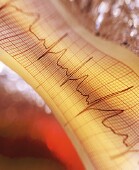
TUESDAY, Aug. 13 (HealthDay News) — New research pinpoints how to spot which heart failure patients are most likely to benefit from getting a pacemaker.
Previous research has shown that receiving a pacemaker can improve symptoms and reduce the risk of hospital readmission and death in some heart failure patients. One-third to one-half of heart failure patients who receive a pacemaker do not improve, however, according to background information in the study.
Being able to identify which patients would be helped most by a pacemaker is important because the surgery to implant the devices is expensive and carries risks, the study authors said.
The researchers, from Denver Medical Health Center, analyzed data from Medicare beneficiaries with heart failure who received a pacemaker between 2006 and 2009. The patients were followed for up to three years. Death rates were 0.8 percent at 30 days after surgery, 9 percent at one year and almost 26 percent at three years.
Rates of readmission to the hospital for all causes were 10.2 percent at 30 days and 43.3 percent at one year, according to the study, which was published in the Aug. 14 issue of the Journal of the American Medical Association.
The researchers found that pacemaker patients with left bundle-branch block and longer QRS duration had the lowest risks of death and readmission to hospital. Left bundle-branch block is a condition that causes disorganized electrical activity throughout the heart. QRS duration is a measurement of the electrical conducting time as measured with an electrocardiogram (EKG).
One expert said the findings will influence how doctors decide which heart failure patients should get pacemakers.
“This study shows that the EKG — a simple, inexpensive tool — can be very effective in determining who may benefit from this expensive but potentially harmful therapy,” said Dr. Ranjit Suri, director of the Electrophysiology Service and Cardiac Arrhythmia Center at Lenox Hill Hospital in New York City.
“Consequently, heart failure specialists, referring cardiologists and implanting physicians should pay attention to this important study,” Suri said. “It demonstrates that a simple EKG can help refine their ability to identify heart failure patients that they may be able to help with device therapy — saving lives and dollars and decreasing the potential for complications.”
Another expert agreed that the findings should alter the way heart failure specialists handle their patients.
“This is an important study that helps to clarify which heart failure patients are more likely to favorably respond to this type of therapy,” said Dr. Sean Pinney, director of the Advanced Heart Failure & Transplantation Program at Mount Sinai Medical Center in New York City.
“This study also reminds us about how much heart failure patients suffer,” Pinney added. “Forty percent of patients were rehospitalized within the first year of follow up, and one out of four patients died within three years. Obviously, there is still much work to be done to identify new strategies to extend and improve the lives of heart failure patients.”
More information
The U.S. National Library of Medicine has more about pacemakers.
Copyright © 2026 HealthDay. All rights reserved.

